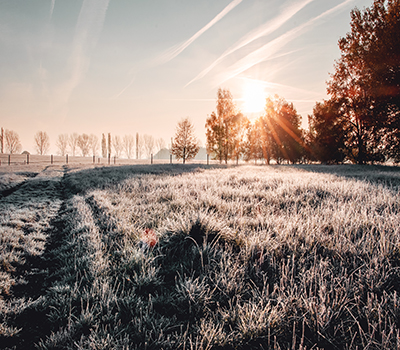Seasonal Affective Disorder (S.A.D) is a type of depression related to changes in seasons, and usually begins and ends around the same times every year. It’s not that uncommon – we all tend to feel a bit fed-up as the nights draw in. The usual time to start feeling the symptoms of S.A.D is in the autumn, and the effects can last through to the end of winter.
In the UK in particular, we tend to be more susceptible to S.A.D, due to the extreme differences in light from summer to winter. The problem is, we need bright light in the morning to re-set our body clock and keep our body in its natural rhythm. Even on an overcast day we can get between 10-30,000 lux of light (lux is used as a measure of the intensity, as perceived by the human eye, of light) if we head outdoors, which sets us up for the day. But offices may only provide around 500 lux of light. So, if we get up in the dark, head to a gloomy office and then come home in the dark we are just not getting our light fix. Then we play havoc with our body clock even more by using bright blue lights before bed, when naturally light would be dim to prepare us for sleep. These changes in seasonal light, combined with our hectic lifestyles and long periods of dark, gloomy days can have dramatic effects on our mental wellbeing, and even our weight. No wonder many of us end up suffering from Seasonal Affective Disorder.

S.A.D. can leave you feeling stripped of energy, withdrawn, moody, and can even affect sleeping patterns. The good news is that there are ways you can help to reduce your S.A.D symptoms………
Try to get out in natural sunlight as often as possible – even if it is just for a 30 minute walk before work or in your lunch-break. Our bodies’ natural responses to light can affect our appetite, energy levels and mood, so getting outdoors could help to improve your symptoms. What’s more, exposure to even 20 minutes of natural sunlight, particularly in the morning, has been shown to help you keep the weight off, which is an added bonus!
The boost of endorphins you get when exercising could help you feel better by flooding your body with those feel-good chemicals. And, exercising in the cold may help to boost brown fat which could help weight loss. What better reason to keep active in winter (preferably outdoors in natural light rather than the gym)?!
We know how the foods we eat can affect our weight, but did you know they can affect your mood too? Make sure you are providing your body with a healthy, balanced diet, and both your weight and your mood could see the positive effects.

High stress levels will only heighten any depressive feelings you’re having. Where possible, try to avoid stressful situations and take steps to manage your stress levels.
Consider investing in a light therapy lamp. Make sure you find one that provides 10,000 lux to mimic natural sunlight and use it to give yourself a light boost in the morning. You can also get lights that mimic natural sunrise and sunset to help tune your body clock even more.
If you’re struggling to deal with your S.A.D, then please speak to your GP in case further help is needed.
Follow the above tips and you may not need to wish the winter away. Instead try to enjoy all of the pleasures it can bring – crisp, frosty mornings, sitting by a roaring fire in the local pub and delicious, home-cooked and nourishing soups and stews!




